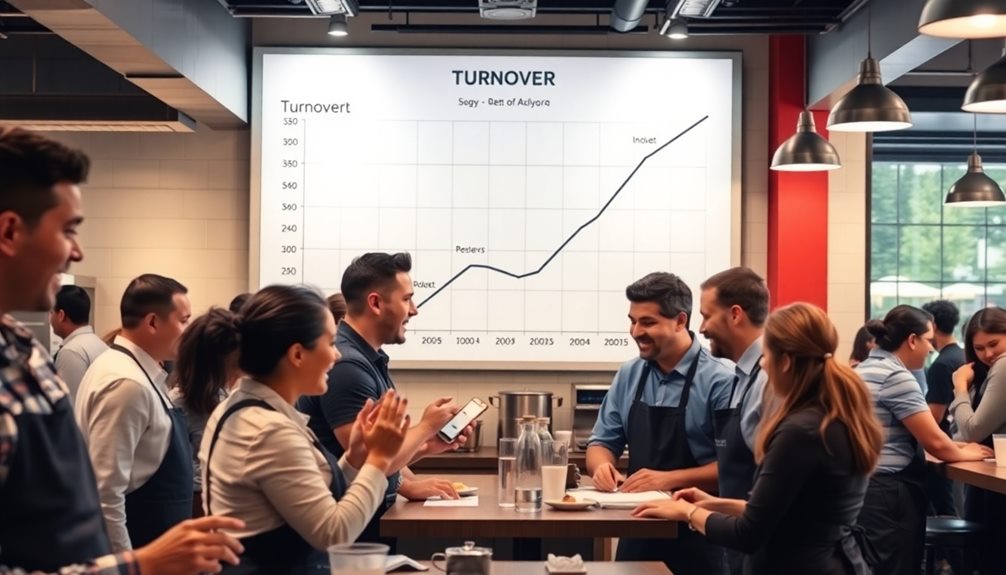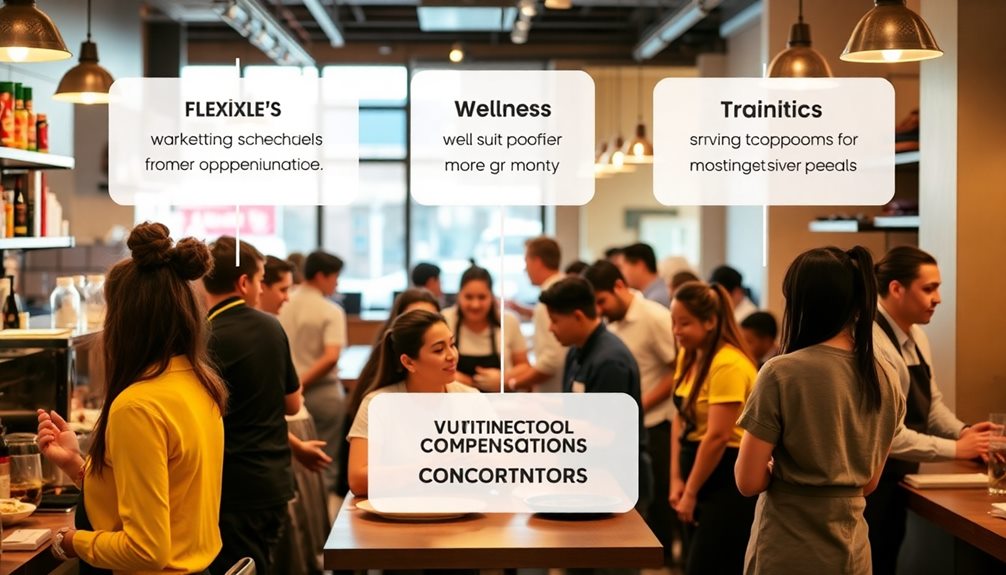To improve restaurant staff retention, focus on enhancing employee satisfaction through competitive compensation and growth opportunities. Offer structured career development and recognition programs to show appreciation for their hard work. Create a supportive work environment with open communication, flexible schedules, and team-building activities. Regularly gather feedback through employee sentiment surveys and exit interviews to address concerns proactively. Additionally, consider implementing innovative compensation approaches like on-demand pay options and extensive benefits. By fostering a positive culture and listening to your team, you'll greatly boost retention rates and create a more engaged workforce. There's more to explore on this topic.
Key Takeaways
- Offer competitive compensation and regular pay reviews to ensure employees feel valued and fairly compensated for their work.
- Implement structured career development plans and ongoing training to promote growth and retention among staff.
- Foster a supportive work environment through open communication, flexibility, and recognition of employee contributions.
- Conduct exit interviews and employee satisfaction surveys to gather insights for continuous improvement in workplace culture.
- Organize team-building activities and social events to enhance relationships and morale within the team.
Understanding Employee Turnover

Employee turnover in the restaurant industry is alarmingly frequent, with rates reaching 75% before the pandemic. This high turnover not only impacts morale but also costs restaurants considerably—about $1,869 per hourly employee in both recruitment and productivity losses.
You might notice that employee dissatisfaction often stems from long hours, lack of appreciation, and limited career growth opportunities. When restaurant employees feel overworked and undervalued, they naturally seek out better work-life balance elsewhere.
The pandemic has intensified this issue, with many industry veterans leaving and creating a labor shortage of 750,000 jobs compared to pre-pandemic levels. This means competition for talent is fierce, making staff retention even more challenging.
Factors like workplace harassment and inadequate compensation can drive employees away, further complicating your efforts to maintain a stable team.
Understanding these primary causes of employee turnover is essential for crafting effective retention strategies. By addressing employee dissatisfaction and offering competitive benefits, you can create an environment where restaurant employees feel valued and motivated to stay.
Recognizing these issues is the first step toward reducing turnover and fostering a more committed workforce.
Effective Retention Strategies

To keep your restaurant staff engaged and committed, implementing effective retention strategies is essential. Focus on these key areas to enhance restaurant employee retention and reduce turnover rates:
- Competitive Benefits: Offer competitive compensation packages, including regular pay raises and retention bonuses. Research shows that addressing low pay concerns can lower turnover rates by up to 63%.
- Career Growth Opportunities: Provide structured career progression plans and ongoing training. Since 75% of restaurant employees leave due to a lack of career growth, investing in their development fosters loyalty.
- Recognition Programs: Regularly acknowledge and reward employee contributions. Even informal recognition can lead to a 14% increase in employee engagement and boost staff morale.
Additionally, prioritize a supportive work environment with flexible scheduling and open communication. This enhances job satisfaction, making employees feel valued.
Conducting exit interviews will also give you valuable insights into why employees leave, allowing you to make necessary changes that improve both retention strategies and workplace culture.
Building a Positive Work Culture

Creating a positive work culture starts with open communication channels that encourage collaboration among your team.
When you implement team-building activities and recognize individual achievements, you foster a sense of belonging and appreciation.
These elements not only boost morale but also lead to higher employee retention rates.
Open Communication Channels
Open communication channels are essential for cultivating a positive work culture in restaurants. When you encourage open communication, you create a space where employees feel comfortable voicing their concerns and suggestions. This leads to higher job satisfaction and improved employee retention, which aligns with the principles of iterative processes for continuous improvement.
To foster this environment, consider implementing the following strategies:
- Regular Management Meetings: Schedule one-on-one meetings with your staff to enhance transparency and trust. This shows employees that their opinions are valued.
- Feedback Loops: Utilize anonymous surveys to gauge employee sentiments. This proactive approach allows you to address issues before they escalate, reinforcing staff loyalty.
- Communication Guidelines: Establish clear guidelines for respectful dialogue. This prevents misunderstandings and helps maintain a harmonious workplace community.
Prioritizing open communication not only boosts job satisfaction but also cultivates a strong sense of belonging among your team.
Team Collaboration Activities
Fostering team collaboration activities can greatly enhance the work culture in your restaurant. Engaging in shared meals or outings allows team members to strengthen their relationships, boosting morale and creating a supportive environment. When everyone feels connected, collaboration flourishes, leading to improved engagement and a sense of community among staff.
Additionally, implementing strategies such as effective preventive maintenance strategies guarantees that the restaurant operates smoothly, allowing staff to focus on their roles without unnecessary interruptions.
Implementing open-book management practices promotes transparency, giving employees insight into business operations. This understanding fosters a shared responsibility for success, enhancing loyalty to the restaurant. Cross-training opportunities not only encourage versatility among staff but also promote teamwork, allowing team members to support one another in various roles.
Regular social gatherings and recognition events cultivate an atmosphere of appreciation, reinforcing commitment among your team. Additionally, consider establishing peer recognition programs. Allowing employees to acknowledge each other's contributions fosters a cohesive work environment where everyone's efforts are valued.
Incorporating these team collaboration activities can considerably impact morale, engagement, and loyalty within your restaurant. By nurturing a culture of support and appreciation, you'll create an environment where team members thrive and feel motivated to stay long-term.
Recognition and Appreciation Programs
Team collaboration activities lay a strong foundation for a positive work culture, but recognition and appreciation programs take it a step further by directly addressing employee morale and loyalty.
When you implement these programs, you show your team that their contributions truly matter, which can greatly reduce turnover rates in the competitive restaurant industry.
In addition, just as Louisiana alimony laws consider the factors influencing financial needs, recognizing staff contributions reflects an understanding of their value and impact on the team's success.
Here are three effective ways to boost employee appreciation:
- Monthly Recognition Programs: Celebrate outstanding staff with awards that highlight their contributions, fostering a sense of pride and motivation.
- Peer Recognition: Encourage colleagues to nominate each other for rewards. This creates a supportive environment and can reduce turnover by up to 25%.
- Celebrate Milestones: Acknowledge work anniversaries and personal achievements to cultivate a sense of community and belonging, which enhances employee engagement.
Innovative Compensation Approaches

When it comes to retaining restaurant staff, innovative compensation approaches can make a significant difference. By implementing models like flat service fees instead of traditional tipping, you can reduce financial strain on employees and attract top talent, as demonstrated by the HOUSEpitality Restaurant Group.
Offering on-demand pay options lets staff access their earnings as they work, greatly enhancing employee satisfaction and retention.
Additionally, providing competitive pay alongside benefits packages, such as tuition reimbursement and health programs, boosts staff morale and fosters long-term loyalty. This is essential, as high turnover can cost 33% to 200% of an employee's annual salary.
Regularly reviewing and adjusting pay structures every 3-6 months shows your commitment to employee welfare, ensuring wages stay competitive with industry standards.
Transparency in compensation practices is also important. Clear communication about pay progression and performance reviews that include self and peer evaluations builds trust and fosters a supportive work culture.
Fostering Teamwork and Development

Creating a collaborative environment can greatly enhance restaurant staff retention. By fostering teamwork, you not only boost employee engagement but also create a positive work environment that encourages growth and satisfaction.
Here are three effective strategies to implement:
- Mentorship Programs: Establishing mentorship initiatives promotes skill development and supportive relationships, leading to a 25% increase in retention. Pairing experienced staff with newcomers can enhance confidence and competence.
- Cross-Training Opportunities: Allowing employees to learn multiple roles increases operational flexibility and job satisfaction by 20%. When team members understand each other's responsibilities, they can collaborate more effectively and adapt to challenges.
- Team-Building Activities: Regular outings and shared meals strengthen interpersonal relationships and boost morale by 15%. These activities foster open communication, enhancing teamwork and creating a cohesive work culture.
Addressing Employee Feedback

To enhance staff retention, it's essential to actively address employee feedback. Regular one-on-one meetings foster open communication, allowing you to hear your team's concerns and suggestions. This practice not only boosts employee satisfaction but also contributes to improved retention rates.
Implementing a structured feedback loop encourages trust and engagement, which considerably lowers turnover in the restaurant industry. Utilizing exit interviews effectively can provide valuable insights into why employees leave, helping you identify and tackle specific issues that might affect retention.
Additionally, regularly evaluating employee satisfaction through surveys can reveal trends and highlight areas for improvement. Research shows that when you actively address employee feedback, turnover rates can decrease dramatically.
Creating an environment where employee feedback is recognized and acted upon not only enhances staff morale but also reinforces a positive company culture. By valuing your team's input, you cultivate a sense of belonging and appreciation, which is fundamental for long-term retention.
Ultimately, addressing employee feedback is an essential strategy for retaining talent and fostering a thriving workplace in the competitive restaurant industry.
Frequently Asked Questions
How to Increase Employee Retention in Restaurant Industry?
To increase employee retention in the restaurant industry, you'll want to offer competitive pay, provide growth opportunities, recognize achievements, promote from within, and gather feedback through exit interviews to enhance workplace culture and satisfaction.
How Do You Improve Staff Retention?
So, you think ignoring your staff's needs will keep them happy? Instead, try offering competitive wages, clear growth paths, and flexible schedules. A little appreciation goes a long way in making them stick around!
What Are the Three R's of Employee Retention?
The three R's of employee retention are Recruitment, Recognition, and Retention. You need to hire well, acknowledge contributions, and create a supportive environment. Doing this fosters loyalty and keeps your team engaged long-term.
How to Improve Turnover Time in a Restaurant?
You might think turnover time's inevitable, but it isn't. Streamlining onboarding, offering competitive wages, and providing flexible scheduling can greatly enhance new hires' experiences, making them feel valued and integrated into your restaurant team.
Conclusion
As you embrace these strategies, picture your restaurant buzzing with happy staff, each one staying longer, smiling brighter. When you cultivate a positive culture and listen to feedback, it's like planting seeds in fertile soil—each employee blooms, contributing to a vibrant atmosphere that keeps customers returning. Just as a well-prepared dish satisfies the palate, a supportive environment nourishes your team, ensuring they feel valued and motivated. With commitment, you'll turn turnover into lasting loyalty.









